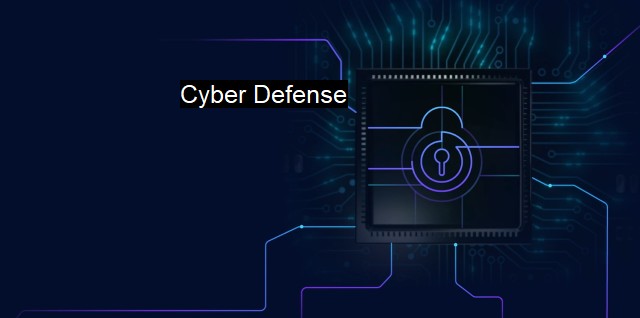What is Cyber Defense?
Cyber Defense: Protecting Critical Assets in the Hyper-Connected World of Cybersecurity
Cyber defense is a crucial aspect of the modern digital world. It refers to the collection of resources, policies, and strategies used to protect networks, systems, and data from cyber-threats. It is a layered approach to cyber protection involving a multitude of tools such as antiviruses, intrusion prevention systems, and secure gateways meant to defend against potential attackers. The eventual goal of cyber defense is to bar unauthorized users, inexperienced insiders, and malicious intruders from accessing or damaging the network.Cyber defense comprises several components. First, there needs to be an awareness of the importance of cybersecurity for all users within the network. With the shift to a digitized workspace, businesses and individual users need to realize the vulnerability of their networks to potential threats.
Secondly, strategies and measures need to be implemented to boost cybersecurity. These measures range from running updated antivirus programs to complex machine-learning algorithms that screen applications for any loopholes that can be exploited by hackers. Firewalls also play a part in blocking malicious traffic trying to make its way into the network.
Antivirus is a critical tool in cyber defense. By continually scanning the computer system for known threats and isolating or eliminating them, it helps protect the user's information. antivirus isn't fool-proof; every day, new viruses and malware surface, and facing these threats requires constant updates and continuous learning. Hence the emergence of AI-powered antiviruses that learn from these new threats and develop ways to protect the system.
Intrusion detection systems (IDS) and intrusion prevention systems (IPS) also contribute to cyber defense by identifying malicious activities and then preventing them from spreading within the network. If an IDS detects an attack, it alerts the system administrators, while IPS work to block the attack.
Marketplaces are pouring resources into cybersecurity. Multi-factor authentication and biometric security measures are further bolstering defense strategies to ensure that only trusted users gain access to the network. Users increasingly use smartphones for shopping and banking, raising their chances of encountering phishing and ransomware attacks. Thus mobile and app security measures have become paramount in the world of cyber defense.
Educating users about basic security hygiene like avoiding dubious links, frequently updating software and applications, and creating strong passwords can also significantly boost the tall walls of cyber defense.
Zero trust architecture is another core part of cyber defense, where the core principle is to trust no one and suspect everyone. All devices or users, even if they're in the network, must verifiably prove their identities before they gain access to the system's resources.
Lastly, corporations should also engage in risk assessment and incident response planning. Assessing their digital assets, identifying vulnerabilities, and organizing strengthening methods are necessary for a robust defense strategy. Also, having an efficient plan to contain and mitigate the risks when an incident occurs helps cut down losses considerably.
Cyber defense, therefore, is an amalgamation of several strategies and resources working in tandem to ensure secure networks and data. Despite how watertight these measures may seem, cyber defense is ever-evolving to counter more sophisticated attacks continually.
To summarize, cyber defense is an incredibly complex, constantly evolving field geared toward protecting networks, systems, and data continually against digital threats. Its arsenal includes a plethora of defense mechanisms, including user education and awareness, up-to-date antivirus programs, intrusion prevention tools, secure gateways, risk assessments, incident response plans, and much more. Staying one step ahead of the perpetrators is fundamentally a matter of staying well-equipped in terms of knowledge, preparedness, and technology.

Cyber Defense FAQs
What is cyber defense?
Cyber defense refers to the measures taken to protect computer networks, systems, and devices against unauthorized access, unauthorized modification, or other cyber attacks.Why is cyber defense important?
Cyber defense is important because cyber attacks can lead to data breaches, financial loss, reputational damage, and legal consequences. Cybersecurity measures such as antivirus software help protect against such attacks.What is antivirus software?
Antivirus software is a type of cyber defense tool that is used to detect, prevent, and remove malware from computer systems. It scans files and programs for malicious code and alerts the user if a virus is found.How can I improve my cyber defense?
You can improve your cyber defense by keeping your antivirus software up to date, using strong passwords, avoiding suspicious emails and downloads, regularly backing up important data, and educating yourself on best cybersecurity practices.| | A | | | B | | | C | | | D | | | E | | | F | | | G | | | H | | | I | | | J | | | K | | | L | | | M | |
| | N | | | O | | | P | | | Q | | | R | | | S | | | T | | | U | | | V | | | W | | | X | | | Y | | | Z | |
| | 1 | | | 2 | | | 3 | | | 4 | | | 7 | | | 8 | | |||||||